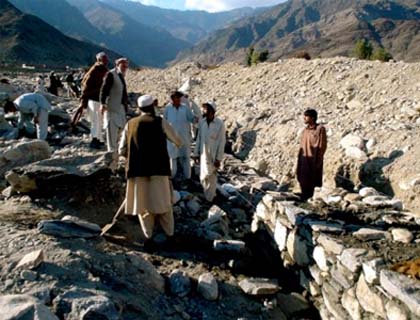The Independent Directorate of Local Governance (IDLG) was established in 2007 to serve as a specialized, umbrella organization responsible for the whole range of issues related to local governance at the provincial and district levels. Prior to that, local governance issues fell under the exclusive realm of the Ministry of Interior and, given the extent of bureaucratic inertia present in Afghanistan, the Ministry had neither the time nor resources and expertise to focus on the manifold and peculiar needs of the local governance sector. It is important to mention that the works of the IDLG have been valuable in improving the state of local governance in Afghanistan.
However, we cannot lose sight of the fact that the works of this independent directorate, although valuable, have largely been in the direction of reinforcing the existing arrangements and frameworks of local governance without bringing in any fresh vision or perspective that are so desperately needed. The IDLG's mandate has largely been about introducing reforms at the micro-level. While it has been successful in this regard to some extent, a macro-level vision of reforming Afghanistan's ailing administrative system has been cast outside the prerogative of this directorate. Indeed, whether during the transitional government in early 2000s or afterwards up until now, the government has consistently resisted calls for undertaking such wide-ranging reforms or has downplayed the importance and relevance of such imperative.
With the shift of responsibilities for local governance to the Independent Directorate of Local governance, there have been improvements in communication, coordination and speed of decision-making between the local agencies and the central agencies including the line ministries. The works of the IDLG has been instrumental in bringing in much-needed coordination between ministries at the provincial and local level. While shortcomings still abound, the IDLG has been able to close or narrow the gap (institutional, policy and human resources) among the line agencies at the local level.
This was evident during my visit to a few districts in Samangan province where improvement backed by the works of IDLG was tangible. Another important area where the IDLG has been able to make improvements is the staffing and recruitment. Training and the so-called capacity building is another area where the IDLG's intervention has been able to make for tangible progress. However, there are still a range of issues that undermine and complicate the agenda and workings of the IDLG and the government of Afghanistan's local governance agenda. The selective and piece-meal enforcement of the applicable regulations and a pervasive culture of rent-seeking continue to undermine the integrity as well as the quality of local governance.
The government of Afghanistan and the independent directorate of local governance need to take into view the sustainability of the programs currently implemented by them and funded by outside actors particularly the United States. The funding cycle for many of such programs runs through 2013 and 2014. Beyond that, the government, as well as, its international partners, indeed, does not have any vision of instilling any sense of sustainability into these largely expensive programs. As is the case with the IDLG (funded largely by the U.S. government), the bureaucratic inertia prevents and renders impossible a clear perspective on sustainability. Under these circumstances, it is not clear whether the hard-earned gains and improvements in local governance made possible through IDLG, among other Western-funded programs, will be possible to be preserved as and when the funding ceases or is scaled back.
The challenges confronting the local governance sector in Afghanistan are formidable and manifold. Another major problem is that the separation of powers is unclear at this level as it is at the national level. The separation line between the Executive, the Judiciary and the Legislature at the local level is non-existent in some areas and blurred in many others.
Yet this is dwarfed by the larger problem of lack of devolution of power at this level. The local representative bodies such as the provincial councils that are officially enshrined in the Constitution do not have substantive legislative powers and have remained largely symbolic plagued by lack of resources and a widespread bias towards them from the line agencies at both the provincial and central levels.
If the end goal is to strengthen the current structures and arrangements of local governance and service delivery to local populations, there exists a pressing need for a major rethinking on the way the government of Afghanistan and the international community approach and handle the issue. The government needs to institutionalize and localize legislative, executive and administrative imperatives with the focus being on meaningfully devolving power and empowering local bodies. This seems to be an over-arching priority given the overall condition of local governance and the current failed top-down approach to fiscal, administrative, legislative and above all, executive structuring of governance.
Perhaps one of the most important tasks is to improve the public knowledge and understanding of government and governance in Afghanistan especially at the local level. People in villages and rural areas are well-aware of the politics of kinship and personality-based administration but are largely unaware and ignorant as to what and how the government ought to be and what rights they are entitled to under a democratic or even a quasi-democratic system.
As long as there is public ignorance of their rights at the local level and in the villages and districts of Afghanistan and as long as they do not have a correct understanding of what and how the government and governance ought to be, the progress that is made at improving local governance will be limited and hard to bring about. The interplay between the people and the agents of governance and service delivery, if managed well enough, can result into powerful synergies and multiplication of the actual results.
These results, in turn, can improve the lives of millions who desperately need help but are helpless in accessing it.

